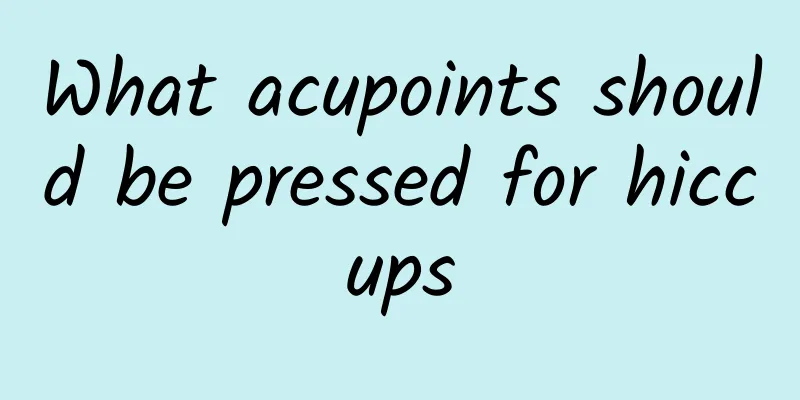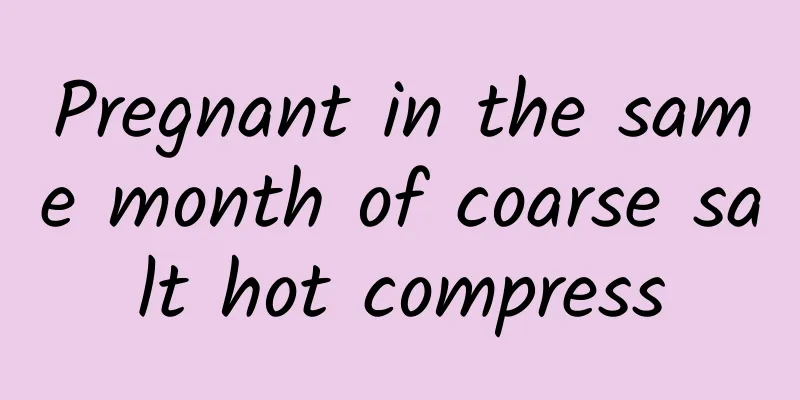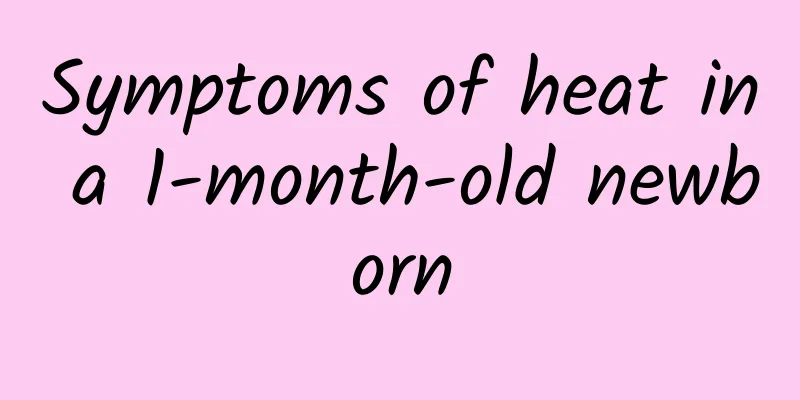What acupoints should be pressed for hiccups

|
Hiccups should be a normal physiological phenomenon that everyone will experience, but hiccups have a certain inducing mechanism, because hiccups are caused by the upward flow of excess air in the human stomach. And hiccups that continue for a period of time will make people feel very uncomfortable, and severe hiccups can also cause dizziness and headaches. When people have long-term hiccups, which acupoints should be pressed to solve the problem? 1. Which acupoints should be pressed for hiccups? 1.1. Press Shaoshang point on the thumb side, one fen away from the nail. When hiccups occur, press the Shaoshang point with your thumb so that the soreness lasts for half a minute, and the hiccups will stop. This method is really effective. When I have hiccups, I just press this acupoint and the hiccups stop. 1.2. Pinch and press the middle finger. Use your left and right fingers respectively to pinch the top of the middle finger hard. After about 1 to 2 minutes, the hiccups will be stopped. 1.3. Pinch and press the Neiguan acupoint. Use your fingers to pinch the "Neiguan acupoint", which is located 6 to 7 cm inside the wrist, about 2 fingers below the first horizontal line. It is also more effective in stopping hiccups. 1.4. Shave the brow bone. Press the thumbs of both hands on the temples on both sides, and use the side of the bent index finger to scrape from the inside to the outside of the brow bone, applying a little force, until you feel a slight soreness. 2. What are the causes of hiccups? Between our chest cavity and abdominal cavity, there is a thick muscle membrane like a hat, called the diaphragm, which separates the chest cavity and abdominal cavity. Like other organs in the body, the diaphragm has a nerve supply and blood supply. When the stimulus that causes hiccups is transmitted to the brain, the brain will issue instructions to cause the diaphragm to have paroxysmal and spasmodic contractions, thus causing hiccups. Continuous or stubborn hiccups are often caused by emergency situations such as encephalopathy, uremia, and diabetes with ketoacidosis. There are also many serious diseases that can cause persistent hiccups. It is particularly worth mentioning that if people with critical conditions have persistent hiccups, it often indicates a poor prognosis. 3. What to eat when you have hiccups People with hiccups should eat soft liquid food, high-protein, high-vitamin food, specifically rice soup. Generally, patients can choose clear liquid soft food after vomiting stops. Rice soup helps digestion and absorption of fat. Pay attention to eating small meals frequently, 6 to 7 meals a day is appropriate. Egg custard. Egg white is rich in protein, 8 essential amino acids and a small amount of acetic acid. It is better to eat it after the symptoms are relieved and the frequency of bowel movements decreases. Minced chicken contains vitamins C, E, etc., has a high protein content, is easy to digest, and can be eaten during the recovery period. Wash the rice clean, put it into a pot, pour in clean water, boil it over high heat first, then simmer over low heat until it becomes thick. What are the treatments for hiccups? 1. Distract attention, eliminate tension and adverse stimulation 2. Take a deep breath first, then hold it for as long as possible, then exhale, and repeat several times. 3. Drink boiled water, especially slightly hot boiled water. Take a big sip and swallow it in several times. 4. Wash your hands, insert your index finger into your mouth, and gently stimulate your throat. 5. Put the mixed gas into a plastic bag and inhale it. The mixed gas contains 90% oxygen and 10% carbon dioxide. 6. Wash the raw leeks, squeeze out the juice and drink it orally. 7. Chew ginger slices. 8. Take 20 persimmon stalks (referring to the stalks of fresh persimmons or persimmon cakes), decoct them in water into 100 ml, and take orally in two doses, 50 ml each time. You can also add leek seeds when frying. 9. Swallowing vinegar method: Take a mouthful of rice vinegar and swallow it slowly in several times. Repeat 2-3 times. Chewing and swallowing spicy food: Use 1-3 cloves of garlic, or 1 scallion, or 1-3 chili peppers, chew them up and swallow them slowly. The hiccups will stop in about 1-3 minutes. What are the complications of hiccups? 1. Gastric inflammation. If you often experience belching and hiccups, or even hiccups without eating, you may have a stomach disease. If you experience dull pain in the upper abdomen, stomach pain, fullness after eating, loss of appetite, or burning pain in the chest or throat, you should see a specialist for diagnosis and treatment. 2. Stroke warning signs. For the elderly, repeated hiccups need more attention because they may be a precursor to a stroke. A stroke that occurs in the back of the head can easily cause persistent hiccups and is more common in women. 3. Patients with esophageal cancer, cardia cancer, and gastric cancer may also experience symptoms of continuous hiccups. Especially for cardia cancer, the cardia is located at the junction of the esophagus and the stomach. It opens when eating and closes after eating to ensure that food in the stomach does not flow back into the esophagus. |
<<: What are the medicines that can unclog pores?
>>: Acupuncture points to improve vision
Recommend
Ingredients and efficacy of donkey hide gelatin blood-replenishing granules
The main function of donkey-hide gelatin blood-re...
What impact does filming have on children?
The rapid development of modern medical technology...
What if a woman can't give birth to a child?
The so-called women cannot have children, mainly ...
What kind of ointment is good for itchy buttocks?
If your butt is itchy, it is generally caused by ...
How long does it take for a crooked mouth to recover after tooth extraction and anesthesia?
Anesthesia is required when extracting teeth. For...
How to use toothpaste to prolong sexual intercourse
Toothpaste is a necessity in our lives and is used...
What to do if your tooth hurts when you eat hot or cold food
I remember there was a toothpaste advertisement t...
Symptoms of lung disease
pulmonary disease It is the name of a disease. Th...
Principles of treatment of hand injuries
Hands are our best friends. We cannot do without ...
Knowledge of Traditional Chinese Medicine Moxibustion
Traditional Chinese medicine has been passed down...
shock! There are actually these misunderstandings about chronic diseases
Chronic diseases mainly affect high-income countr...
Treatment of ulcerative colitis
Colitis poses a great threat to human health and ...
The harm of drinking Panax notoginseng flower soaked in water
As a precious Chinese herbal medicine, Panax noto...
Can smoking relieve stress?
To a certain extent, smoking can relieve certain ...
Rough skin
Generally, when people say that a person has good...









